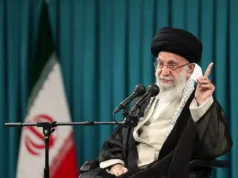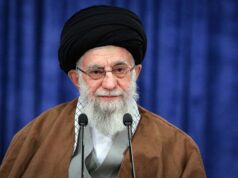Iranian lawmaker Gholamreza Mesbahi Moghadam said on Friday that Tehran has the knowledge and capability to produce nuclear weapons but will never do so, as it is not Iran’s policy. This statement — the first in which a prominent politician publicly acknowledged Iran’s capabilities — came amidst reports of Iran meeting with world powers to discuss its nuclear program.
On Monday, the UN’s International Atomic Energy Agency (IAEA) confirmed that Iran will sit down with what is known as the P5+1 — Russia, China, Germany, France, the United Kingdom, and the United States — on April 14. But how, in light of Moghadam’s claim and Iran’s continuing enrichment of uranium to 20 percent, will the Obama administration and its allies define success?

A poster of Iran’s Supreme Leader Ayatollah Ali Khamenei and the late Ayatollah Ruhollah Khomeini is seen next to centrifuges in a Natanz nuclear facility. (Photo: Reuters) |
According to a New York Times report, the U.S. and Europe want Iran to agree to stop enriching uranium to high levels, end the shipping of existing stockpiles of that fuel out of the country, and immediately close and ultimately dismantle the fortified nuclear facility near Qom, known as Fordo. Such demands differ slightly from those of Israeli Prime Minister Benjamin Netanyahu, who recently said his goal is to see Iran stop its uranium enrichment activities altogether, remove already enriched uranium, and close down Fordo.
Iranian nuclear chief Fereydoon Abbasi Davani reportedly called the West’s demands “irrational,” saying that Tehran was forced to build its underground facility due to the threat of attack. He did, however, also raise the possibility that Tehran may agree to stop producing 20 percent enriched uranium and instead only enrich uranium to lower levels as is needed for power generation. It is unclear if this is the stance Iran will take when talking to the world powers. Tehran has also said it will not agree to preconditions ahead of negotiations.
If, somehow, Tehran does agree to American and European demands, that would only be a first step in the process. Even more important than coming to an agreement is creating a reliable and verifiable monitoring regime to ensure that Iran holds up its end of the bargain, and clearly outlining to Tehran what will happen if it fails to stand by its word.





